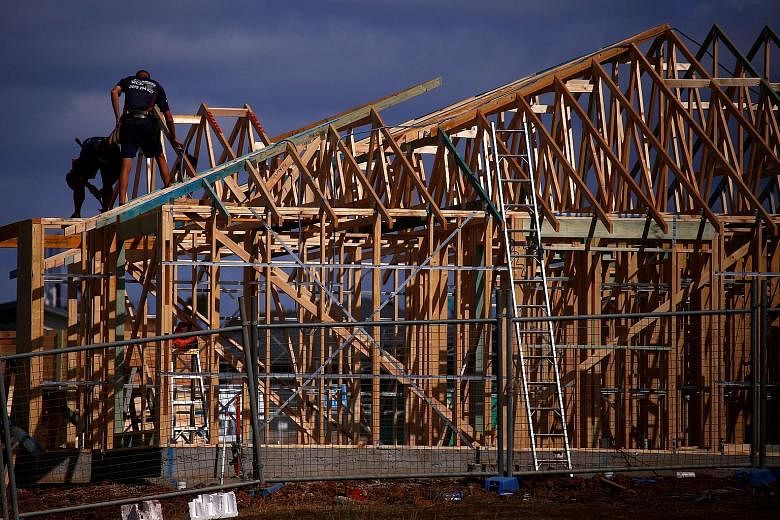A fall in home prices in Australia's largest city has prompted speculation that the unthinkable has occurred and the property market boom is finally coming to an end.
After a staggering surge in which property prices rose by 75 per cent in Sydney in the past five years, values fell last quarter by 2.1 per cent.
It was only a slight drop but it was enough to puncture the prospect of an ever-inflating market and prompted forecasts of sizeable declines over the coming two years.
Most analysts have predicted drops of about 3 to 10 per cent for the Sydney market over the coming year, though forecasts for national prices were more upbeat.
"Sydney's housing market has become the most significant drag on the headline growth figures," Mr Tim Lawless, from property research data group CoreLogic, told Fairfax Media.
Sydney and Melbourne home prices have been rated among the top 10 most unaffordable in the world. Melbourne prices have risen 59 per cent in the past five years. But growth has slowed significantly and prices there rose by just 0.9 per cent last quarter.
Commentators believe a downturn is starting, but there is disagreement about whether it is likely to be a correction or a collapse. A sudden downturn could have severe repercussions for the nation's economy.
Economist Saul Eslake, a vice-chancellor's fellow at the University of Tasmania, told The Straits Times he believed the Sydney market had peaked but he did not believe a drastic fall was likely. He said many Australians could afford to withstand falling home prices.
"It is not a surprise that there are now signs that the market has passed a turning point," he said.
Australians have A$6.8 trillion (S$7.1 trillion) tied up in property, and more than A$1.7 trillion tied up in home loans. The nation's household debt-to-income ratio is a record 200 per cent - among the world's highest.
The booming prices have been caused by record low interest rates, as well as relatively low unemployment of 5.4 per cent, high immigration, housing shortages in some areas, and strong interest from foreign buyers, particularly from China.
Federal regulators introduced measures last year to rein in the market and limit risky lending, and they appear to be working. Curbs on interest-only loans - in which borrowers need to repay only the interest - are believed to have dampened prices, as have measures to scale back bank loans to investors.
An investor who claims to own 200 properties, Mr Kevin Young, told The Australian Financial Review that the changes had forced him to sell some properties. He said his bank shifted his loan repayments from interest-only to traditional principal-plus-interest earlier than he expected. "How would you manage if your bank told you you had to pay 45 per cent more per month on your mortgage?" he said.
Australia Treasurer Scott Morrison last month said the curbs had significantly cooled investment in Sydney and Melbourne, but also appeared to suggest that these markets were extremely delicate.
"With the slightest change to interest-only lending, we have seen Sydney house prices fall from double digits, from 15 per cent growth to 5 per cent in six months," he said. "That is with the slightest, scalpel-like change housing borrowing."
Further curbs are expected this year, including forcing people applying for bank loans to more accurately state their living expenses.
An ABC News poll last week of five economists found that most expected falls in Sydney and Melbourne but rises in some areas and cities such as Hobart and Brisbane.
BIS Oxford Economics managing director Robert Mellor said prices in Sydney could fall by up to about 5 per cent this year.
Most commentators believe a moderate fall could help the economy. It could prevent rampant speculation, reduce future mortgages' size and allow people to have more money for household spending.
But some, such as Professor Richard Holden, from the University of New South Wales Business School, are more pessimistic about the current state of the market, arguing that it is underpinned by loans based on shaky credit.
"Having lived in the United States during the mortgage meltdown, I'm sorry to say that I've seen this movie before," he wrote in The Australian Financial Review earlier this month. "People borrow too much and banks let them; there is moral hazard and fraud in mortgage issuances; regulators finally do something - very little and very late."
However, Mr Eslake said he believed there had been tighter lending to less wealthy buyers in Australia than in the US before its housing crisis from 2007.
"For there to be a big drop, history suggests you need a large volume of forced sellers," he said. "Although Australians have a lot of debt, most is owed by rich households... We don't have people hanging on by their fingernails."

